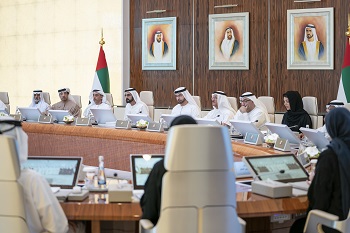Media Center
UAE Cabinet reviews 2018 achievements
The UAE Cabinet meeting, chaired by His Highness Sheikh Mohammed bin Rashid Al Maktoum, Vice President, Prime Minister and Ruler of Dubai, has reviewed the achievements of the UAE Government in 2018.
These achievements were presented during the first cabinet meeting of this year and included the most important decisions and policies in line with the UAE Vision 2021 and the UAE Centennial Strategy 2071.
The meeting was attended by H.H. Lt. General Sheikh Saif bin Zayed Al Nahyan, Deputy Prime Minister and Minister of the Interior, and H.H. Sheikh Mansour bin Zayed Al Nahyan, Deputy Prime Minister and Minister of Presidential Affairs.
The Cabinet adopted 669 resolutions in its 21 meetings last year, reflecting the government's interest in developing the pivotal sectors in the UAE in accordance with the directives of President His Highness Sheikh Khalifa bin Zayed Al Nahyan.
"I am confident that my team will achieve our goals for the new year which will lead us to the achievement of the UAE Vision 2021," Sheikh Mohammed bin Rashid said.
"In the new year, which is the 'Year of Tolerance', we will present to the world the model of Emirati people who are dedicated at work, love their country, and tolerant with all people," he added.
The UAE Cabinet started last year with the announcement of the allocation of AED11 billion in social assistance to all groups of low income Emiratis for the next three years.
The Cabinet also adopted a plan to establish 7,270 housing units for citizens across the UAE with a budget of AED7 billion, reflecting the leadership's interest in housing issues and the provision of decent living conditions. The Cabinet approved the largest federal budget of the UAE with a value of AED180 billion for the next three years.
The budget for 2019 was approved at a value of AED60.3 billion and was allocated to sectors directly related to the Emiratis wellbeing. During the past year, the Cabinet also adopted several important policies aimed at community development in the UAE and activating the role of various groups.
The most important was the launching of the National Policy for Senior Emiratis as an integrated care system to ensure a decent life for them and at the same time to ensure their active participation in the development process.
In the education field, the Cabinet adopted the National Strategy for Higher Education 2030 with the aim of graduating generations of Emirati professionals in the vital sectors and ensuring the ranking of UAE’s universities among the top 1,000 international universities.
In health sector, the Cabinet adopted a draft federal law on public health aimed at enhancing the society's public health, in addition to the adoption of unified national standards for hospitals in order to raise the quality of health services and hospitals.
The Cabinet also issued a federal law regulating the pharmaceutical professions, and a federal law on reproductive medical assistance to guarantee access to all Emiratis in need of medical assistance.
The Cabinet also adopted a number of resolutions and strategies aimed at raising the percentage of Emiratisation, and the establishment of the National Human Resources Development Fund to double and speed up Emiratisation by 200 percent in less than one year.
The year 2018 witnessed a number of decisions to enable and empower Emirati women including the first legislation of its kind for gender pay equality.
In the field of foreign investment and attracting talent, a new foreign investment law was approved last year allowing foreigners to own 100 per cent in UAE-based businesses and a new system of entry visas for investors and professional talents providing them with a long-term visa for up to 10 years.
In the area of environment and food security, the Cabinet adopted the Water Security Strategy 2036 to ensure sustainable access to water in the country and the National Strategy for Food Security 2051 to enable the production of sustainable food in the UAE and reduce food waste.
Other items on the meeting’s agenda included the approval of a new 'Emirates Code of Accessible Environment' to ensure the maximum integration for people of determination in the society.
The Code, which will be implemented on a federal level, will ensure that People of Determination (people with disabilities) live independently and participate fully in all aspects of life.
The code will be implemented in all vital building, transportation system and beyond. The Cabinet also discussed a number of issues related to the development of government services and government work in a number of ministries and federal entities, as well as other topics on its agenda.


